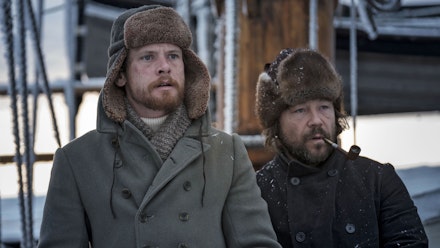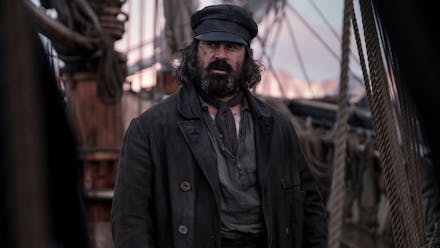Airing on: BBC Two
Episodes viewed: 5 of 5
For all the snowy white on show in The North Water, Andrew Haigh’s five-part adaptation of Ian McGuire’s novel has a black heart. Filmed within the Arctic Circle, reputedly further north than any other production, it details the exploits of an 1850s whaling ship with a mixture of high-end spectacle, powerful performances and beautiful filmmaking craft. But this isn’t ‘boy’s own’ adventure stuff. Instead, it’s a piercing look at the darkness inside men.

At the heart of The North Water is a battle of opposites, a thinker versus a doer. The thinker is Patrick Sumner (Jack O’Connell), an educated ex-army surgeon running away from a traumatic past in India. The doer is Henry Drax (Colin Farrell), a feral master harpooner who lives in the moment — the show opens with him rutting in a barn — and shares something of the hulking evil of Great Expectations’ Magwitch. The pair find themselves on board Yorkshire whaling ship The Volunteer, bound for the icy waters between Greenland and Canada in search of seal pelts and whale blubber. But the bottom has fallen out of the arctic mammal market and skullduggery is afoot. The Volunteer’s Captain Brownlee (Stephen Graham, excellent as ever), in cahoots with the ship’s owner Baxter (Tom Courtenay, excellent as ever) has a devious plan: to sink the ship and cash in the insurance.
Working in a completely different register to Weekend, 45 Years and Lean On Pete, Haigh mounts stunning set-pieces, drone shots perfectly conveying the fragilities of man against the unforgiving landscape. Episode 1 ends with a brilliantly orchestrated seal hunt (warning: the show doesn’t stint on depicting animal cruelty) as the greenhorn Sumner joins the experienced hunters shooting and clubbing seals; Episode 2’s whale-chase is far more exciting than anything in Ron Howard’s much bigger-budgeted In The Heart Of The Sea, ending when Drax mounts the whale and stabs it, blood spurting out of the blowhole. But Haigh’s filmmaking is debatably more interesting inside the ship, going for broke in dark-lit interiors, using tight close-ups at odd angles to disorientate. This, along with numerous C-bombs, puts clear water between Haigh’s handiwork and standard BBC period-drama fare.
A piercing look at the darkness inside men.
Beyond the seafaring narrative, the story smuggles in other genres, too. The first half is an investigation into who sodomised the cabin boy (Stephen McMillan), with Sumner refusing to believe the obvious culprit — a scene where he examines a suspect's foreskin is tense in the extreme. But as the story evolves, it develops into a survivalist drama, with the whalers bartering with Inuits, the harsh elements and a bear who must have taken notes watching The Revenant.
If the final two episodes don’t match the intensity of previous ones, the uniformly strong cast keep you engaged, particularly a bulked-up, sparingly used Farrell burning a hole in the screen as a man with no concept of morality, and O’Connell, who gives Sumner, potentially a bland surrogate for the audience, depths and complexity. Together, they help this sea shanty to lost souls land.
